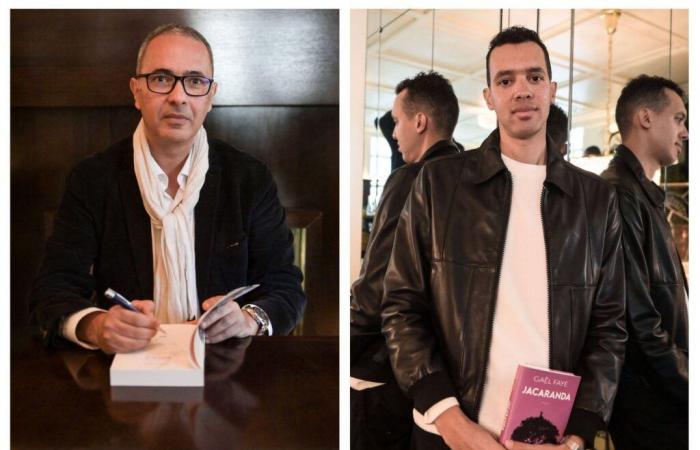The competition was keen, but it was hard to see Goncourt 2024 escaping Kamel Daoud, the big favorite since the first days of the literary season with Houris (Gallimard, 416 p., €23). And it is with six votes from the first round that the 122eGoncourt Prize was awarded by the ten academicians gathered at Drouant to the 54-year-old Franco-Algerian writer. Then two votes remained for Hélène Gaudy, one for Gaël Faye, and one for Sandrine Collette.
” With Houristhe Goncourt Academy crowns a book where lyricism competes with tragedy and which gives voice to the suffering linked to a dark period in Algeria”commented the president of the jury, Philippe Claudel. Before Kamel Daoud arrived, out of breath, who said to himself “very happy, upset”. The former journalist from Oran immediately paid tribute to France, where he resides, “a country that protects writers”.
For their part, in another room of the traditional Parisian brasserie, the Renaudot prize jurors and their president Jean-Marie Gustave Le Clézio distinguished Gaël Faye for his second book, Jacaranda (Grasset, 288 p., €20.90).
“Literature traces another path of memory”
Two books of pain and memory, but also two very political novels which return to the genocide in Rwanda for that of Gaël Faye, on the tragedies experienced in Algeria thirty years ago for the work of Kamel Daoud, even though today its publisher was refused access to the Algiers Book Fair…
An impressive book with a trying style, Goncourt recounts the drama of a country bloodied by ten dark years, from 1992 to 2002… Hourisit is the story of Aube, a young woman who escaped death and hesitates to give life. Rescued when she should have died with her throat cut, she no longer has a voice. But it is his inner voice that we hear, which hums and cries, murmurs and shouts. Will she take the risk of giving birth to this child she is carrying?
Are we suspicious of the words of a young pregnant woman? “I resist the erasure that, in this country, has been imposed on people like me”confides the narrator. The silence imposed by the authorities is enshrined in the law, it is article 46 of the penal code, placed at the forefront of the novel: “Anyone who, through their statements, writings or any other act, uses or exploits the wounds of the national tragedy is punishable by imprisonment of three to five years. (…). » So we should keep quiet, forget. Do not write.
But Dawn's life force does not fade: “It is a crazy, ruinous and bad idea to try to go back in time. » What men cannot say, writing can save: “This novel shows how literature, in its high freedom of auscultation of reality, its emotional density, traces, alongside the historical story of a people, another path of memory”added Philippe Claudel.
A demanding, captivating, harsh read without being devoid of poetry
A statement that could be applied to the novel by singer and writer Gaël Faye, recounting the initiatory path of a young Franco-Rwandan man. The country of a thousand hills is the setting of a long history of massacres of which the young Milan, of French father and Rwandan mother, knows nothing. Even the Tutsi genocide of 1994 is in the past for him. Until the teenager finds his roots.
If he understands the unspeakable, he always comes up against maternal silence: “We don’t come on vacation to a land of suffering. This country is poisoned. We live with killers around us and it drives us crazy. » Popular justice rekindles wounds while participating in reconciliation. “It is imperfect justice, but it has the merit of freeing speech and, above all, of putting an end to the impunity that has always existed. » And women, here again, keep and maintain hope. Stella, the aptly named child, will be guardian of the spark of hope.
With these novels which rekindle the wounds to raise awareness, two writers pay a fraternal tribute to the victims in very different styles. Fluid, Jacaranda gives way to bloody stories while recounting the narrator's journey. Hourisin harsher writing, makes no concessions to the reader. A demanding, captivating, harsh read without paradoxically being devoid of a certain poetry. Two books that matter. The jurors of the two prizes were not mistaken.
The Renaudot essay prize was awarded to Sébastien Lapaque for Checkmate in paradise (Actes Sud, 336 p., €22.50), and the Renaudot pocket book prize to Serge Rezvani for The Light Years (Philippe Rey, 528 p., €13.90).






